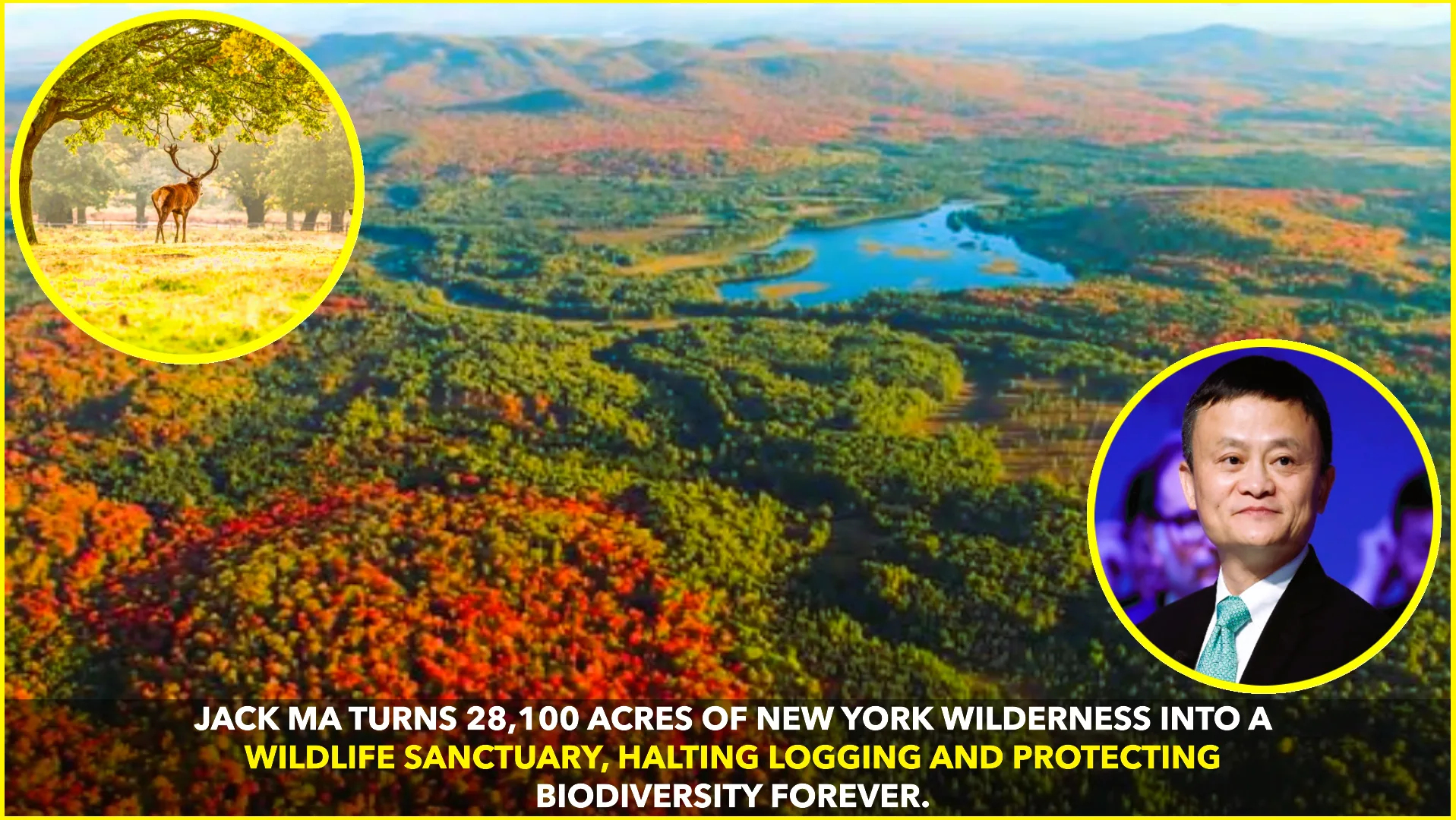Jack Ma’s Wild Vision
In 2015, Chinese billionaire and Alibaba founder Jack Ma made a purchase that surprised many—not another tech venture, but 28,100 acres of pristine wilderness in New York’s Adirondack Mountains. The property, known as Brandon Park, is a sprawling natural treasure featuring nine miles of the Saint Regis River, trout-filled streams, deep forests, sparkling lakes, serene ponds, and even a working maple syrup operation.
According to Good News Network, Ma paid $23 million for this breathtaking slice of nature. But rather than developing it for profit or turning it into a private retreat, he took a very different approach—transforming the land into a permanent wildlife sanctuary.
Preserving Nature, Halting Exploitation
One of Ma’s first moves was to announce a complete halt to logging and mining in the area. These activities, while economically profitable in the short term, can cause long-term damage to ecosystems. By banning them, Ma has ensured that Brandon Park’s rich biodiversity will remain intact for generations to come.
The Adirondack region is home to countless species of plants and animals, some of which are rare or endangered. From black bears and moose to countless bird species, the sanctuary provides a safe haven away from the threats of industrial activity. Its forests act as vital carbon sinks, while its rivers and streams contribute to one of the cleanest water systems in the United States.
“Preserving forests and water resources is not just about protecting the environment—it’s about securing the future,” Ma has been quoted as saying in past interviews about conservation.
A Personal First for Ma
This project is significant for another reason—it’s Jack Ma’s first conservation investment outside China. In his home country, Ma has supported numerous environmental initiatives, from reforestation efforts to marine conservation. His work with The Nature Conservancy—a global environmental nonprofit where he serves as a board member—has deepened his commitment to protecting nature worldwide.
The decision to invest in the Adirondacks signals a widening of his environmental scope, showing that his concern for the planet crosses national borders.
Creating a Nonprofit to Manage the Land
Rather than managing Brandon Park as a private estate, Ma is reportedly establishing a nonprofit organization to oversee its operations. This means the land won’t just be a luxury possession—it will be run with the purpose of environmental protection, research, and possibly limited eco-tourism in the future.
By placing it under nonprofit stewardship, Ma ensures that the sanctuary will be managed in a way that prioritizes ecological health over financial gain. This model has been used successfully by other conservationists to protect large swaths of land from development pressures.
A Unique Property in the Adirondacks
Brandon Park itself is a rare find. Spread across thousands of acres, it combines diverse habitats—dense forests, river corridors, open meadows, and aquatic ecosystems. The Saint Regis River winds gracefully through the property, providing both a scenic highlight and a crucial water source for wildlife.
The presence of a maple syrup operation adds a cultural and agricultural dimension to the property. While Ma’s focus is on conservation, sustainable operations like maple tapping could continue under guidelines that protect the forest and avoid overexploitation.
Symbolic and Practical Impact
Environmentalists see Ma’s move as more than just a private purchase—it’s a signal to other wealthy individuals and corporations about the role they can play in protecting natural resources.
Land conservation in the U.S. often depends on private action. In the face of budget cuts to public conservation agencies, purchases like this can prevent ecologically valuable land from falling into the hands of developers or extractive industries.
Furthermore, Ma’s involvement with The Nature Conservancy suggests that his sanctuary might eventually contribute to broader conservation research. Scientists could study its ecosystems to understand biodiversity, climate resilience, and sustainable land management practices.
Global Environmental Leadership
Ma’s conservation efforts align with a growing movement among global business leaders to take responsibility for environmental stewardship. From Jeff Bezos’s Earth Fund to Bill Gates’s investments in climate technology, there is a shift in the philanthropic priorities of billionaires toward climate and conservation causes.
But unlike some high-profile environmental projects that focus on futuristic solutions, Ma’s Adirondack sanctuary is a back-to-basics approach—protecting the natural world exactly as it is, free from human interference.
A Legacy Beyond Business
While Ma is best known for transforming global e-commerce through Alibaba, his environmental work could become just as important to his legacy. Brandon Park may never produce revenue like Alibaba, but its value is measured in clean water, preserved wildlife habitats, and the quiet rustle of wind in untouched forests.
If more individuals with means follow this path, large-scale conservation could become a more common and achievable reality.
Source: Good News Network – Alibaba Founder Jack Ma Buys New York Wilderness to Create Wildlife Sanctuary










